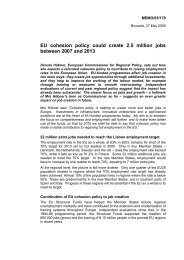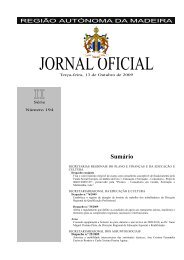Industrial Relations in Europe 2012 - European Commission - Europa
Industrial Relations in Europe 2012 - European Commission - Europa
Industrial Relations in Europe 2012 - European Commission - Europa
You also want an ePaper? Increase the reach of your titles
YUMPU automatically turns print PDFs into web optimized ePapers that Google loves.
Portugal<br />
The number of low-paid workers <strong>in</strong> the public sector has <strong>in</strong>creased due to<br />
wage cuts.<br />
Romania Low- paid workers have <strong>in</strong>creased <strong>in</strong> the public sector due to a wage cut of 25<br />
per cent <strong>in</strong> 2011.<br />
United K<strong>in</strong>gdom Increase <strong>in</strong> low-paid workers <strong>in</strong> the public sector due to a shift of many public<br />
sector employees from full-time to <strong>in</strong>voluntary part-time work<strong>in</strong>g.<br />
Gender <strong>in</strong>equality has also been fuelled by public sector adjustments, as a result of the<br />
traditional importance of the public sector for women’s employment, access to higher<br />
positions and more flexible time and work and family arrangements.<br />
Job losses <strong>in</strong> the public sector have also contributed to <strong>in</strong>creas<strong>in</strong>g the workload and work<strong>in</strong>g<br />
hours of those public sector employees who rema<strong>in</strong>, while overtime rates have been reduced<br />
or frozen <strong>in</strong> a number of countries. The simultaneous reduction <strong>in</strong> expenditure has also<br />
reduced the human and material resources available for deliver<strong>in</strong>g public services, which have<br />
generally rema<strong>in</strong>ed at the same levels or have actually <strong>in</strong>crease – as is the case <strong>in</strong> health and<br />
education.<br />
The absence of social dialogue <strong>in</strong> the reform process and the abolition of a number of<br />
provisions that encouraged collective barga<strong>in</strong><strong>in</strong>g <strong>in</strong> the public sector have also contributed to<br />
a worsen<strong>in</strong>g of work<strong>in</strong>g conditions <strong>in</strong> the public sector. The public sector could therefore be<br />
seen as hav<strong>in</strong>g lost its role as a model employer, offer<strong>in</strong>g job security, collective barga<strong>in</strong><strong>in</strong>g,<br />
codeterm<strong>in</strong>ation and good pay and work<strong>in</strong>g conditions, <strong>in</strong>stead converg<strong>in</strong>g with private sector<br />
practices.<br />
These changes and the way they have been implemented have triggered a wave of<br />
demonstrations and strikes by public sector employees – often jo<strong>in</strong>ed by other social groups –<br />
throughout <strong>Europe</strong>.<br />
Future prospects for human capital and job quality <strong>in</strong> the public sector are also under threat.<br />
Not only have deteriorat<strong>in</strong>g wages and work<strong>in</strong>g conditions <strong>in</strong> the public sector and high<br />
unemployment led to significant emigration – especially among doctors, nurses and teachers –<br />
but the public sector has stopped attract<strong>in</strong>g the quantities of young qualified graduates which<br />
hitherto have been its lifeblood.<br />
All of these changes – especially when result<strong>in</strong>g <strong>in</strong> a grow<strong>in</strong>g mismatch between <strong>in</strong>creas<strong>in</strong>g<br />
demand and fall<strong>in</strong>g supply – cannot be neutral for the future quality of public services. This is<br />
already to be observed <strong>in</strong> education and health care <strong>in</strong> some countries – on <strong>in</strong>dicators such as<br />
a lower ratio of teachers to students <strong>in</strong> the classes and longer wait<strong>in</strong>g lists for admission to<br />
hospitals – but also threatens the efficiency of the public adm<strong>in</strong>istration.<br />
While the public sector reform process cont<strong>in</strong>ues <strong>in</strong> <strong>Europe</strong>, it will be important to cont<strong>in</strong>ue<br />
such monitor<strong>in</strong>g, especially as it will be possible to evaluate the effects of the current reforms<br />
<strong>in</strong> more detail only as more data become available <strong>in</strong> the course of time.<br />
190

















